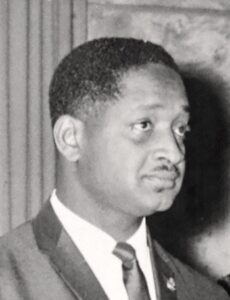
Forbes Burnham
*Forbes Burnham was born on this date in 1923. He was an Afro Guyanese politician and leader.
Linden Forbes Sampson Burnham was born in Kitty, a suburb of Georgetown, Demerara County, British Guiana, as one of four (Olga, Freddie, Jessica, and Flora)[3] children. His parents were James Ethelbert Burnham, a schoolmaster,[2] and Rachel Abigail Sampson, and he grew up in an Afro Guyanese Methodist household. Burnham's father had roots in a slave family in Barbados, and his family name came from the surname of the plantation owner. Burnham's ancestors migrated to British Guiana after the abolition of slavery.
Forbes Burnham attended Kitty Methodist School and Central High School before attending the prestigious secondary school, Queen's College, where he met future political rival Cheddi Jagan. At Queen's College, Burnham excelled academically, receiving the British Guiana Scholarship to study at the University of London in 1942. Burnham could not travel to the United Kingdom due to World War II, instead completing a Bachelor of Arts degree from the University of London through external examinations.
After he was allowed to travel to London, Burnham received a law degree from the London School of Economics in 1947 or 1948 and was the president of the West Indian Student Union at the university. He went on to pass the bar in 1948 and became a member of Gray's Inn. Burnham met many African and Caribbean students – including Abubakar Tafawa Balewa of Nigeria, Seretse Khama of Botswana, and Kwame Nkrumah of Ghana, as well as Michael Manley of Jamaica and Errol Barrow of Barbados – during his studies in London. Burnham won the Best Speaker's Cup in London, which was awarded by the Faculty of Law. He also was a member of the League of Coloured Peoples.
He left the United Kingdom to return to British Guiana in 1949. Educated as a lawyer, Burnham was instrumental in the foundation of two political parties (the People's National Congress and the People's Progressive Party) that would come to dominate the politics of Guyana. During his time as head of government, Guyana moved from a British colony to a republic with no constitutional ties to the United Kingdom. Nationalizing foreign-owned private industries characterized his premiership, membership of the Non-Aligned Movement, and authoritarian domestic policy. Despite being widely regarded as having a significant role in the political, social, and economic development of Guyana, his presidency was marred by accusations of Afrocentrism, state-sanctioned violence, corruption, and electoral fraud.
Burnham's administration put in place many of the national symbols of Guyana during his premiership. He was Premier of British Guiana from 1964 to 1966, Prime Minister of Guyana from 1964 to 1980, and then the first executive president of Guyana (2nd president overall) from 1980 to 1985. He was a strongman who embraced his version of socialism. Burnham improved women's legal rights in Guyana with the release of the State Paper on Equality for Women in 1976, which was aimed at "securing equality of treatment by employers of men and women workers" and "having sex discrimination unlawful in employment, recruitment, training, education and the provision of housing, goods, services and facilities to the public." Guyana obtained massive debts during Burnham's tenure, experienced no GDP growth between 1973 and 1993, and experienced relatively high inflation of around 10% per year in the same period.
As of 2022, the two political parties that Burnham founded remain the two most popular and influential parties in Guyanese politics, with Burnham's People's National Congress Reform party being the most crucial member in A Partnership for National Unity, and these two parties closely contesting the 2020 Guyanese general election. Support for the two parties continues to follow the racial divide between Afro-Guyanese and Indo-Guyanese. His first marriage was to Trinidadian Sheila Bernice Lataste-Burnham in May 1951. With Lataste, Burnham had three children. The couple later divorced. In February 1967, Burnham married high school Latin teacher Viola Victorine Harper. Burnham had two daughters with Viola.
Forbes Burnham died of heart failure during throat surgery in Georgetown on August 6, 1985, at the age of 62.